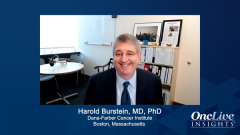
MONARCH 2 and MONARCH 3: Pooled Analysis of Abemaciclib + Fulvestrant
Expert perspectives on the pooled analysis from MONARCH 2 and MONARCH 3, combining frontline abemaciclib with fulvestrant.
Episodes in this series

Transcript:
Harold Burstein, MD, PhD: One of the great things that the pharmaceutical teams have been doing with these studies in the use of CDK 4/6 inhibitors is doing really long-term follow-ups for these patients. That's been very important because it's allowed each of the CDK 4/6 inhibitors abemaciclib, ribociclib, and palbociclib to demonstrate a survival benefit, not just progression-free survival, but an overall survival benefit as well. That's been really powerful because for a long time in the space of ER-positive metastatic breast cancer, there had been a bit of nihilism that we actually couldn't demonstrate a survival benefit because patients might get so many lines of therapy and all these things. These drugs are really important and they do improve overall survival. So, there is credit to the teams for doing all that.
What we saw recently at the 2021 San Antonio Breast Cancer Symposium meeting were long-term follow-ups of the MONARCH 2 and -3 trials of fulvestrant with or without abemaciclib. Those studies continue to show several important things. One is that the regimen is reasonably well tolerated. There are no late toxicity signals that emerged. We spoke a moment ago about the major side effects of abemaciclib, which can include diarrhea and neutropenia, but again, for most patients, this is a manageable set of adverse events. Obviously, the progression-free survival data were well known. What these studies both now show are trends favoring a survival benefit—in some instances, statistically significant survival benefit. I think even more important is clinically compelling data that there's a survival gain for our patients. So, very important long-term follow-up shows no new problems with safety and persistent deep long-term benefits for use of abemaciclib in that setting.
The broad clinical implication is that this class of drugs clearly improves overall survival in metastatic ER-positive breast cancer. These should be the standard of care and they are, and they're widely used and very successful products. In terms of this drug versus the others, there have been very similar reports from the MONALEESA series of trials and from the PALOMA series of trials using ribociclib and palbociclib respectively. So, I think that my own interpretation is that this is a class effect for these drugs, and that all of these drugs have a very similar impact on progression-free and overall survival. Mostly the decision to use them is based on patient tolerability and the desired adverse event profile.
Transcript edited for clarity.







































